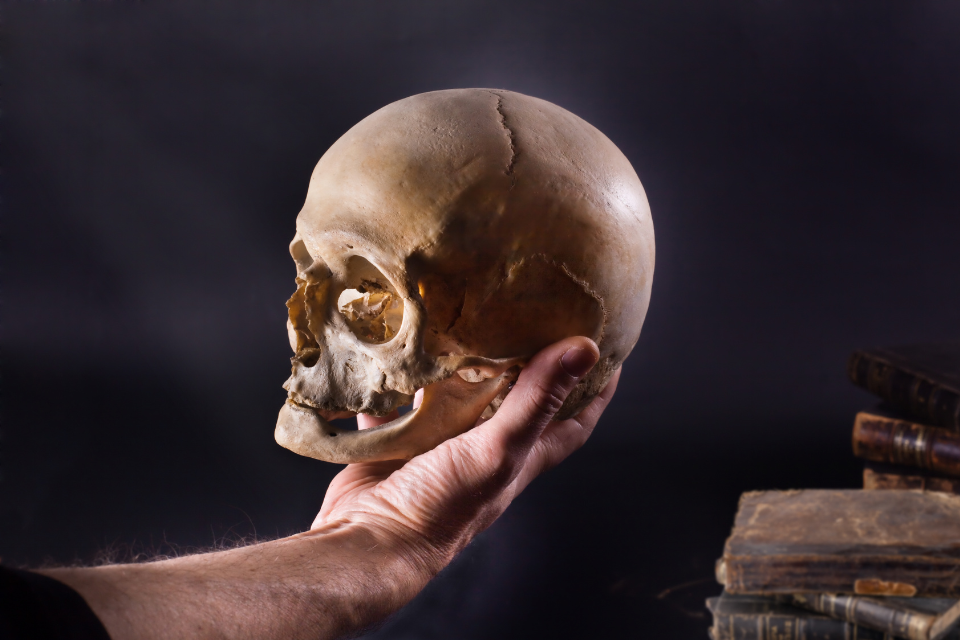'Hamlet': The beginning of modern literature
July 21, 2021

Photo Credit: Vasiliki via Getty Images
by Phil Radoff and Jack Curley
Much like the guards at Elsinore Castle, longtime BOLLI members are always "on the watch" for announcements of another of Professor Billy Flesch’s Shakespeare lectures. Billy’s remarkable analytical skills and insights, along with his ability to connect the Bard’s works to our time and place, are well known to the denizens of 60 Turner Street (whether remote or in person).
This was the third time that some BOLLI old-timers explored "Hamlet"’s world with Billy as our guide. One reason we keep coming back is that we always look forward to some new insight or to a delicious return to a familiar trope — like Shakespeare’s treatment of the passage of time: Hamlet asserts to Ophelia that his mother looks cheerful "only two hours after my father died." She chides him gently: "Nay, 'tis twice two months, my lord." But in fact two hours is just the amount of time that has elapsed since the play began and the audience learned of the death of Hamlet’s father. And we scarcely take note of Shakespeare’s mastery in convincing us that the Hamlet we meet in Act 1 is barely out of his teens, while the Hamlet who returns in Act 5 — only a few months later in the action of the play — is (as the grave digger informs us) a mature thirty-year-old.
Billy’s focus this time around was on "Hamlet" as the "beginning of modern literature." While a claim can be made that "every great work is the origin of modern literature in a different way," Billy insists that "Hamlet" was the first to develop multiple characters with psychological depth, displaying interiority, psychology, and anxiety. "The play," he asserts, "gives us access to the character’s inner experience — how we represent ourselves to ourselves." If this sounds Freudian, it should come as no surprise. Billy is fond of quoting Freud’s acknowledgement that "the poets were there before me." Likewise, the portrayal of Hamlet as a "brooder, thinker, and worrier" falls in line with the characteristics of many of the angst-ridden characters familiar from today’s literature.
While we tend to think of Hamlet as a brooding procrastinator, Billy points out that he also experiences moments of euphoria throughout the play: First, when the ghost tells him that Claudius was his father’s slayer. Hamlet now has an excellent reason to hate Claudius beyond the fact that Claudius married his mother. Second, when Hamlet rejoices to discover that his dear friend Horatio has unexpectedly arrived from Wittenberg. Finally, when Hamlet learns that a troupe of travelling players has come to Elsinore, for he can have them perform the Murder of Gonzago and watch Claudius’s reaction to the murder depicted in the play: "The play’s the thing Wherein I’ll catch the conscience of the king." Indeed, Hamlet’s trickery in arranging for the play within the play is but one example of his Machiavellian character. Billy points out that there are other tricksters in the play, but certainly Hamlet is the most capable, as he adopts an "antic disposition" to misdirect Claudius and Polonius and later revises the letter from Claudius to England that sends Rosencrantz and Guildenstern to the fate that Claudius had intended for Hamlet.
Billy notes that the first Elizabethan audiences to see "Hamlet," after watching the opening scenes, probably anticipated either a play about a war between Denmark and Norway or a familiar "revenge tragedy," i.e., one which includes satisfying elements of violence in a just cause, a clever or courageous avenger, comeuppance for the villain and, typically, the death of the avenger. "Hamlet," of course, could hardly be more different: not only is war with Norway averted (by Claudius), but the guilt of Claudius, the putative villain, is not clearly established; Hamlet, the putative avenger, is an anguished, hesitant hero; there is not a single new death until the end of Act 3 — and it is the wrong victim (Polonius); and when Hamlet finally kills Claudius in Act V it is to avenge the death of his mother, not his father.
The Hamlet who returns from his aborted voyage to England in Act 5 is not only a lot older than the youth who departed from Elsinore in Act 4, but he has become more fatalistic and acquired a sense of the transitory nature of life. As he approaches the duel with Laertes that Horatio warns against, Hamlet assures his friend that death will most assuredly come sooner or later: "If it be now, ’tis not to come. If it be not to come, it will be now. If it be not now, yet it will come — the readiness is all."
After Billy’s final lecture, we were left, as "Hamlet"’s first audiences must also have been left, with many unanswered questions. Did Gertrude and Claudius have a romantic relationship that preceded the death of the late king? Was Gertrude complicit in her husband’s murder? Indeed, is it possible that Claudius and not old king Hamlet (who travelled frequently and for extended periods) was young Hamlet’s biological father? Was the ghost telling the truth about the murder? If Claudius had lived longer, would he have been adjudged a better king than his deceased brother? After all, he achieved peace with Norway, stabilized the transfer of authority by marrying Gertrude, and generously proposed to designate Hamlet as his successor. Might it be that we, the audience, were wrong to have wanted Hamlet to act earlier? Could he, in fact, have been legitimately pursuing evidence to remove any doubt of Claudius’s guilt?
Perhaps Shakespeare’s great gift to his many generations of admirers is that we still wonder about these questions and still deeply care about the play’s outcome.